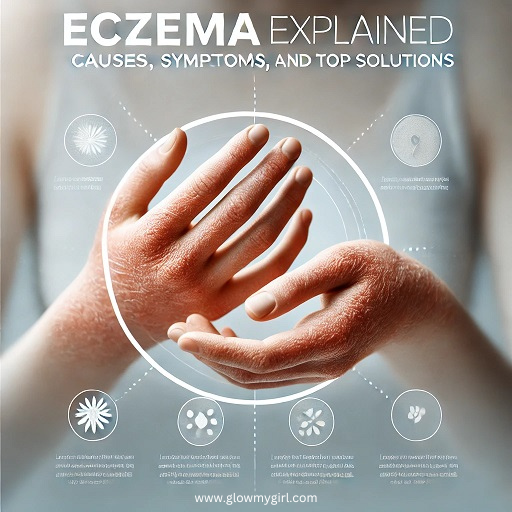What is Eczema?
Eczema is a
chronic inflammatory condition that affects the skin barrier, making it more
prone to dryness, irritation, and infection. While eczema can occur at any age,
it is most common in children, with about 10-20% of children globally
experiencing the condition. Adults can also develop eczema, either as a
continuation from childhood or as adult-onset eczema.
Causes and Triggers:
The exact
cause of eczema remains unclear, but it is believed to result from a
combination of genetic and environmental factors. A defective skin barrier,
which allows moisture to escape and irritants to enter, plays a key role. Triggers
can include:
1. Allergens:
Dust mites, pollen, or pet dander.
2. Irritants:
Soaps, detergents, or certain fabrics.
3. Weather Changes: Cold, dry air or excessive heat and humidity.
4. Stress:
Emotional stress can exacerbate symptoms.
5. Dietary Factors: Certain foods, like dairy or nuts, may act as triggers for some
individuals.
Symptoms of Eczema:
· Dry, scaly skin
· Itching, often severe
· Red, inflamed patches
· Oozing or crusting in severe cases
· Thickened, leathery skin from
prolonged scratching
Symptoms
often flare up periodically and then subside, varying in severity between
individuals.
Managing Eczema:
While eczema
cannot be cured, it can be effectively managed with proper care and lifestyle
changes. The main goals are to reduce flare-ups, manage symptoms, and repair
the skin barrier.
1.
Hydration: Keeping the skin moisturized is
crucial.
2.
Avoid Triggers: Identify and minimize exposure to
personal eczema triggers.
3.
Medication: Topical corticosteroids,
antihistamines, and newer options like biologics (e.g., Dupixent) may be
prescribed for severe cases.
4.
Skin-Friendly Routines: Use gentle, fragrance-free cleansers
and lukewarm water for bathing.
Top Products for Eczema-Prone Skin:
Here are
some dermatologist-recommended products to soothe and manage eczema:
1.
CeraVe Moisturizing Cream
· Contains ceramides and hyaluronic
acid to restore the skin barrier.
· Non-greasy and suitable for sensitive
skin.
2.
Eucerin Eczema Relief Cream
· Enriched with colloidal oatmeal, a
natural anti-inflammatory agent.
· Provides long-lasting hydration and
relieves itching.
3.
Aveeno Eczema Therapy Itch Relief
Balm
· Formulated with colloidal oatmeal and
ceramides.
· Offers immediate relief for itchy and
irritated skin.
4.
Vanicream Moisturizing Cream
· Free of common irritants like
fragrances, dyes, and preservatives.
· Gentle and highly effective for
sensitive skin.
5.
La Roche-Posay Lipikar Balm AP+
· Contains shea butter, glycerin, and
niacinamide.
· Clinically proven to reduce dryness
and flare-ups.
6.
Aquaphor Healing Ointment
· An occlusive that locks in moisture
and protects the skin barrier.
· Ideal for extremely dry or cracked
skin.
When to See a Doctor:
While most
cases of eczema can be managed with over-the-counter products and lifestyle
changes, severe or persistent symptoms may require medical attention. Consider
seeing a dermatologist if:
· Your eczema significantly impacts
daily life.
· You experience frequent infections.
· Over-the-counter treatments aren’t
effective.
Conclusion
Eczema is a
manageable condition with the right approach. By understanding its causes,
symptoms, and triggers, individuals can take steps to minimize flare-ups and
maintain healthier skin. Incorporating dermatologist-approved products into
your skincare routine can provide much-needed relief and comfort. For severe
cases, consulting a healthcare professional ensures access to advanced
treatment options.

